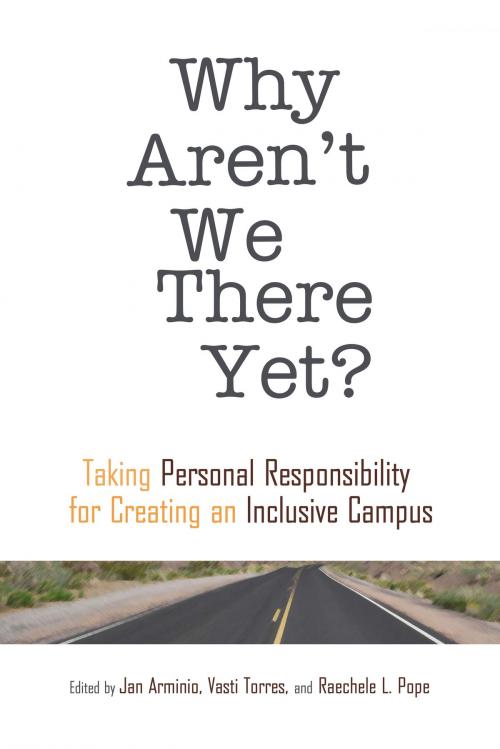Why Aren't We There Yet?
Taking Personal Responsibility for Creating an Inclusive Campus
Nonfiction, Reference & Language, Education & Teaching, Higher Education| Author: | ISBN: | 9781579227494 | |
| Publisher: | Stylus Publishing | Publication: | March 12, 2012 |
| Imprint: | Stylus Publishing | Language: | English |
| Author: | |
| ISBN: | 9781579227494 |
| Publisher: | Stylus Publishing |
| Publication: | March 12, 2012 |
| Imprint: | Stylus Publishing |
| Language: | English |
While our campuses have evolved from being exclusionary and intolerant, and publicly espouse the objectives of being welcoming, accepting, affirming, and engaging, the data on admissions, retention, and graduation clearly indicate that these goals have not been achieved.
The contributors to this book offer new insights to improve student affairs, emphasizing action that recognizes this is a complex and multi-faceted process, and beginning with the assertion that, without recognizing the influences of privilege and inequality, we educators cannot promote truly welcoming environments.
This book focuses on guiding individuals and groups through learning how to have difficult conversations that lead us to act to create more just campuses, and provides illustrations of multiple ways to respond to difficult situations.
The book is framed around the five elements of the process of engaging in difficult conversations that not only advocate for change but also create change: self knowledge, knowledge of and experiences with others, understanding historical and institutional contexts, understanding how to change the status quo, and transformative action.
An ACPA Publication
The contributors to this book offer new insights to improve student affairs, emphasizing action that recognizes this is a complex and multi-faceted process, and beginning with the assertion that, without recognizing the influences of privilege and inequality, we educators cannot promote truly welcoming environments.
This book focuses on guiding individuals and groups through learning how to have difficult conversations that lead us to act to create more just campuses, and provides illustrations of multiple ways to respond to difficult situations.
The book is framed around the five elements of the process of engaging in difficult conversations that not only advocate for change but also create change: self knowledge, knowledge of and experiences with others, understanding historical and institutional contexts, understanding how to change the status quo, and transformative action.
An ACPA Publication
While our campuses have evolved from being exclusionary and intolerant, and publicly espouse the objectives of being welcoming, accepting, affirming, and engaging, the data on admissions, retention, and graduation clearly indicate that these goals have not been achieved.
The contributors to this book offer new insights to improve student affairs, emphasizing action that recognizes this is a complex and multi-faceted process, and beginning with the assertion that, without recognizing the influences of privilege and inequality, we educators cannot promote truly welcoming environments.
This book focuses on guiding individuals and groups through learning how to have difficult conversations that lead us to act to create more just campuses, and provides illustrations of multiple ways to respond to difficult situations.
The book is framed around the five elements of the process of engaging in difficult conversations that not only advocate for change but also create change: self knowledge, knowledge of and experiences with others, understanding historical and institutional contexts, understanding how to change the status quo, and transformative action.
An ACPA Publication
The contributors to this book offer new insights to improve student affairs, emphasizing action that recognizes this is a complex and multi-faceted process, and beginning with the assertion that, without recognizing the influences of privilege and inequality, we educators cannot promote truly welcoming environments.
This book focuses on guiding individuals and groups through learning how to have difficult conversations that lead us to act to create more just campuses, and provides illustrations of multiple ways to respond to difficult situations.
The book is framed around the five elements of the process of engaging in difficult conversations that not only advocate for change but also create change: self knowledge, knowledge of and experiences with others, understanding historical and institutional contexts, understanding how to change the status quo, and transformative action.
An ACPA Publication















